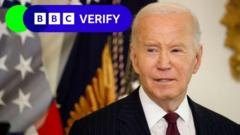Biden's decision comes amid a blend of political pressures and past statements he made about not intervening in his son’s legal matters. As the backlash grows, critics, especially from the Republican party, have seized the opportunity to question Biden's integrity and intentions.
After Hunter Biden’s convictions related to federal felony gun and tax charges over the summer, the White House had consistently expressed that there would be no presidential pardon for him. In interviews, President Biden emphatically stated, “Yes” when asked if he had ruled out a pardon. He later stated, “I will abide by the jury decision” and “will not pardon him.” These statements were reinforced by White House Press Secretary Karine Jean-Pierre, who reiterated that Biden had no plans to help his son.
However, in a recent news conference, President Biden clarified that Hunter was a victim of "a miscarriage of justice," which starkly contrasts his earlier assertions that he was satisfied with the judicial process. This shift has left many questioning the motivations behind the pardon, suggesting it may be politically motivated given the context of political rivalries.
Republican leaders were swift in their condemnation. President-elect Donald Trump called the pardon an “abuse” of power, while James Comer, the House Oversight Committee chair, characterized it as an attempt to deflect accountability. This response points to the broader narrative regarding the potential use of executive power for personal gains—an issue that has been contentious in American politics.
Historically, presidential pardons have been utilized in family matters, with notable examples including Bill Clinton pardoning his half-brother and Donald Trump granting pardons to associates. Nevertheless, Biden's acknowledgment of a wide time frame for Hunter's pardon—covering crimes committed from January 2014 to December 2024—is unprecedented. Legal experts find it unusual to issue pardons before sentencing, as was the case with Hunter, who is still awaiting final judgment.
Biden’s previous critiques of Trump's pardons, which he denounced as politicized and a breach of integrity, further complicate his position. By pardoning his son, Biden risks undermining previous arguments made against his predecessor, thereby intensifying scrutiny on the integrity of the executive branch.
As critics dissect the implications of this pardon, the conversation also intertwines with broader questions about the nature of justice and accountability, raising the stakes for Biden's presidency and future legislative endeavors.
After Hunter Biden’s convictions related to federal felony gun and tax charges over the summer, the White House had consistently expressed that there would be no presidential pardon for him. In interviews, President Biden emphatically stated, “Yes” when asked if he had ruled out a pardon. He later stated, “I will abide by the jury decision” and “will not pardon him.” These statements were reinforced by White House Press Secretary Karine Jean-Pierre, who reiterated that Biden had no plans to help his son.
However, in a recent news conference, President Biden clarified that Hunter was a victim of "a miscarriage of justice," which starkly contrasts his earlier assertions that he was satisfied with the judicial process. This shift has left many questioning the motivations behind the pardon, suggesting it may be politically motivated given the context of political rivalries.
Republican leaders were swift in their condemnation. President-elect Donald Trump called the pardon an “abuse” of power, while James Comer, the House Oversight Committee chair, characterized it as an attempt to deflect accountability. This response points to the broader narrative regarding the potential use of executive power for personal gains—an issue that has been contentious in American politics.
Historically, presidential pardons have been utilized in family matters, with notable examples including Bill Clinton pardoning his half-brother and Donald Trump granting pardons to associates. Nevertheless, Biden's acknowledgment of a wide time frame for Hunter's pardon—covering crimes committed from January 2014 to December 2024—is unprecedented. Legal experts find it unusual to issue pardons before sentencing, as was the case with Hunter, who is still awaiting final judgment.
Biden’s previous critiques of Trump's pardons, which he denounced as politicized and a breach of integrity, further complicate his position. By pardoning his son, Biden risks undermining previous arguments made against his predecessor, thereby intensifying scrutiny on the integrity of the executive branch.
As critics dissect the implications of this pardon, the conversation also intertwines with broader questions about the nature of justice and accountability, raising the stakes for Biden's presidency and future legislative endeavors.





















